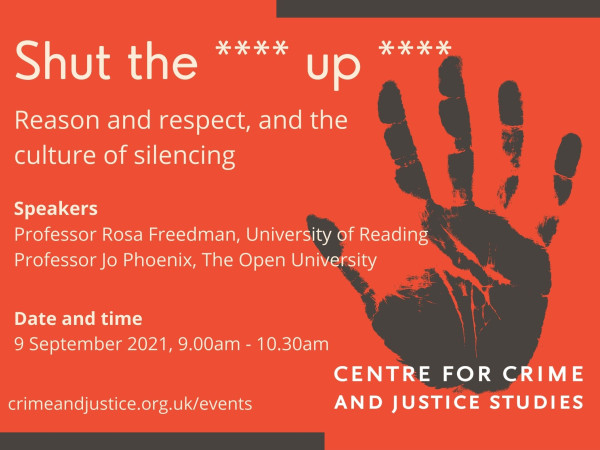Sep

Rosa Freedman and Jo Phoenix in conversation on where legitimate protest ends, and cancellation and silencing begins.
Background
- How can activists and academics, researchers and policy thinkers, contribute to public debates about gender and other contentious issues?
- What are the limits to free speech and academic freedom?
- Is there a right to offend, or to not be offended?
- Where does legitimate protest end, and cancellation and silencing begin?
Our two speakers – Professor Jo Phoenix of The Open University, and Professor Rosa Freedman of Reading University – are ideally placed to address these questions.
Watch the discussion
About the speakers
In December 2019, the University of Essex Centre for Criminology cancelled a seminar at which Jo Phoenix had been due to speak, on the subject of “Trans rights, imprisonment and the criminal justice system”. A flyer circulating on the university campus on the day of the cancelled seminar bore a violent image and the words “SHUT THE **** UP, ****. Jo Phoenix has since set up the Gender Critical Research Network at the Open University, a move that itself provoked a furious backlash from certain activists and academics.
A month later, in January 2020, Rosa Freedman was due to speak at a roundtable discussion at the University of Essex on the subject of “The State of Antisemitism Today”, as part of the Holocaust Memorial Week event. After receiving complaints that her views on gender identity amounted to “hate speech”, a decision was taken not to send her a formal invitation to speak. A member of the University posted a tweet that compared her views to Holocaust denial. Rosa Freedman is herself Jewish.
Following a review by the Barrister, Akua Reindorff, the University issued a formal apology to Professors Freedman and Phoenix in May this year.
Against the background of the Higher Education (Freedom of Speech) Bill, currently making its way through parliament, this webinar is an opportunity to hear from two women who have been working on the front-line, in relation to one of the most contentious areas of criminology, socio-legal studies and public policy more generally.